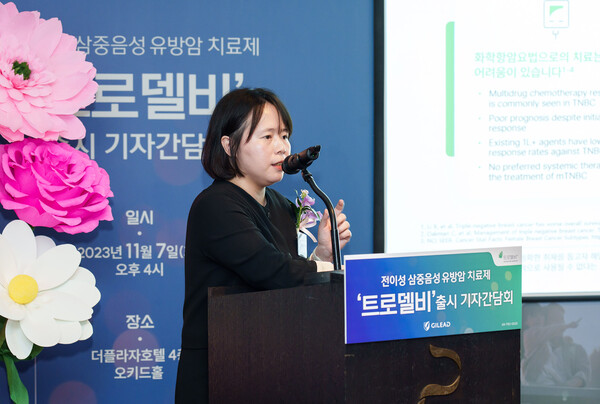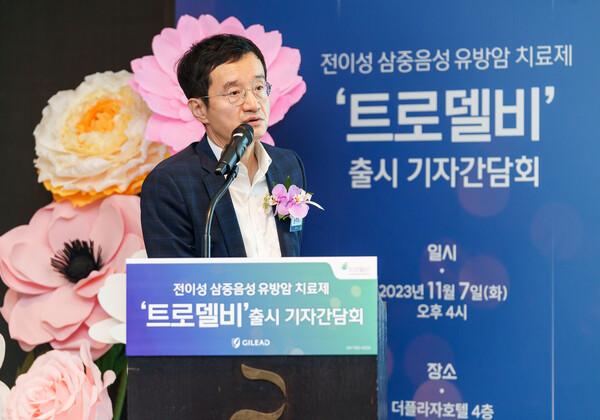Gilead Sciences Korea is seeking insurance coverage of its new drug Trodelvy (ingredient: sacituzumab govitecan) for the treatment of triple-negative breast cancer (TNBC).
Speaking at a press conference celebrating the launch of the drug at the Plaza Hotel on Tuesday, the company said that it is currently pending presentation before the Cancer Drugs Benefit Appraisal Committee, which is the first gateway to obtaining insurance coverage for cancer treatments.
The company also stressed that it plans to start an early access program (EAP) program within the year to subsidize part of the drug costs to alleviate the financial burden of treatment for patients until Trodelvy is covered by insurance.
Trodelvy, the first and only Trop-2 targeting antibody-drug conjugate (ADC), was approved by the Ministry of Food and Drug Safety in May and launched in Korea in October. It stands out as the only treatment approved by the MFDS for patients with metastatic triple-negative breast cancer beyond the second line of therapy, regardless of genetic mutations or biomarkers.
The drug's mechanism involves binding to the Trop-2 protein, highly expressed in various cancer types, releasing the drug inside tumor cells, thereby minimizing the impact on healthy cells and effectively targeting the tumor microenvironment.
During the conference, Professor Kim Jee-hung of the Department of Medical Oncology at Gangnam Severance Hospital spoke on the urgent need for new treatment options for TNBC, which has poor prognoses and high recurrence rates.

"TNBC is a subtype with a poor prognosis among breast cancers, where more than half of the patients experience a recurrence within three to five years after diagnosis, and about 70 percent initially metastasize to the brain or lungs," Professor Kim said. "While chemotherapy is the standard treatment, it faces challenges such as frequent multi-drug resistance and low response rates."
Notably, when primary chemotherapy fails, the progression-free survival is merely three to four months, she added.
Kim stressed that although new drugs like targeted therapies and immunotherapies have been proven effective, their use is limited by factors such as specific genetic mutations and PD-L1 expression levels.

Consequently, Professor Kim emphasized the need for effective treatments for patients with metastatic TNBC who have failed first-line therapy.
In a situation with such a high unmet medical need, Professor Sohn Joo-hyuk of the Department of Medical Oncology at Yonsei University College of Medicine stressed that Trodelvy could become the new treatment alternative for metastatic TNBC and introduced the clinical efficacy and safety results of the drug.
According to Sohn, in the phase 3 ASCENT clinical trial, Trodelvy significantly improved progression-free survival by 59 percent and overall survival by 52 percent in patients with metastatic TNBC without brain metastases receiving second-line treatment or beyond, compared to single-agent chemotherapy.
"Trodelvy also showed a favorable safety profile and a statistically significant improvement in health-related quality of life (HRQoL)," he said. "Major international guidelines, including the National Comprehensive Cancer Network (NCCN) and the European Society for Medical Oncology (ESMO), already recommend Trodelvy for the treatment of metastatic triple-negative breast cancer in the second line or beyond."
Meanwhile, Gilead Science Korea announced its efforts and vision in the oncology field for cancer patients in Korea.
"The company is actively investing in clinical research to build an innovative oncology pipeline that considers the local cancer treatment environment," Gilead Sciences Korea Medical Director Lee Joo-yeon said. "Gilead has received approvals in the U.S. and Europe for treatments targeting six types of cancer, including breast cancer and diffuse large B-cell lymphoma, and is conducting clinical programs for 14 types of cancer."
Notably, Trodelvy is also currently being evaluated for clinical efficacy in other various solid tumors, including metastatic bladder cancer and non-small cell lung cancer, she added.
Lee stressed that Gilead is committed to the goal of providing therapeutic benefits to over 500,000 cancer patients worldwide by 2030 through treatment innovations in various types of cancer, including breast cancer, lung cancer, and bladder cancer.
Related articles
- Gilead launches Trodelvy, 1st Trop-2 ADC, in Korea
- Limited treatment access hinders progress against triple-negative breast cancer
- Gilead's Trodelvy approved for metastatic triple-negative breast cancer in Korea
- Metastatic triple-negative breast cancer patients' voices reach Assembly, urging Trodelvy inclusion

